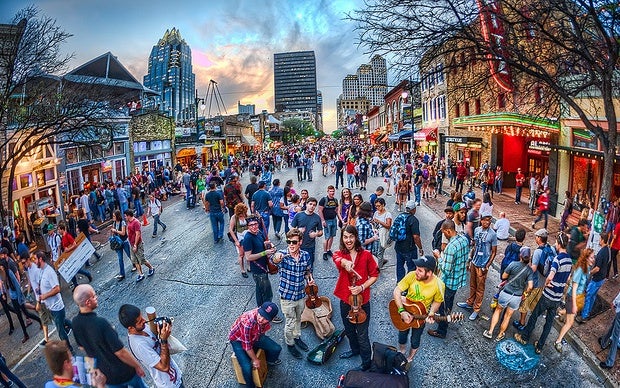English | Español
Many cities have found music to be a way to fulfill some of their socio-economic objectives, on top of those that are specifically cultural. For example, Austin (Texas, USA) or Adelaide (Australia) have been declared musical cities and have developed innovative and creative strategies to take advantage of the opportunities that the music industry has to offer.
Other cities and organizations have followed their lead, making music a driver of progress worldwide:
- Amsterdam was the first city to choose a night-time mayor, a figure responsible for coordinating and strengthening the nightlife and music scene in the Dutch capital.
- In New York, Mayor Bill de Blasio announced a plan to build low-cost housing for musicians and artists, in order to preserve and promote this sector’s contributions to the city.
- In South Africa, the organization Bridges for Music uses music as a medium for social integration and to raise awareness about development issues.
- In the UK, UK Music produces annual reports on the impact of musical tourism over the local economy.
In 2004, UNESCO established the Creative Cities Network in order to promote international cooperation among cities that see creativity as a means for sustainable development and urban progress, as well as a tool for social integration and the preservation of cultural diversity. Since then, about 20 cities have been named musical cities by UNESCO, including Bogota, Medellin, Kingston and Salvador.
Bogota was the fifth city and the first in Latin America to join this network. In a city with an active and prosperous music scene like Bogota, this appointment promoted the creation and implementation of policies dedicated to put music at the center of city life. Since then, Bogotá has developed and implemented a series of public policies to foster greater intercultural dialogue by using music as a tool for social transformation and to overcome some of the city’s main challenges.
An example of these policies is Bogotá’s Music Plan, created in collaboration with several industry players, both public and private. This plan looks at issues such as training, creating musical circuits and the protection of spaces dedicated to live music. One of the measures taken within the plan was the creation of Bogota’s Music Cluster in February 2015 in order to strengthen the pillars that directly affect the industry’s competitiveness—development and innovation, promotion and marketing, regulation and human talent—and to transform the city into the main music business center in Latin America.
What can Latin American cities do to promote their development through music?
Like Bogota, other cities in the region can also develop strategies to enhance their music industry, and to join the global movement to make music a driver of development. In 2015, under the slogan “a strong and sustainable music industry is the most efficient way to build, maintain and expand vibrant and economically prosperous cities,” the Music Cities Convention was born: an event created by consulting firm Sound Diplomacy and by Martin Elbourne—co-founder of the festivals like The Great Escape and WOMAD—in order to regularly bring together representatives of local governments, legislators, academics, agents of the music industry and urban planners to analyze the role of the music industry as a tool for:
- Creating jobs
- Increasing local revenue without raising taxes
- Streamlining and promoting public transport
- Managing tourism
- Regenerating urban areas
- Retaining and attracting talent and investments
- Social integration and the rationalization of urban infrastructure.
Since its first edition in Brighton in 2015, the Convention held a second edition in Washington DC and is preparing for a third meeting in the city of Brighton on May 18. This new edition will bring together professionals and thinkers like Carlos Chirinos, a professor at NYU and promoter of the song “Africa Stop Ebola” to raise awareness and educate the population of Guinea about this disease; Mirik Milan, the Night Mayor of Amsterdam; and Eddie Bridgeman, the director of Space Meanwhile, among others.
 Shain Shapiro in the 2015 Music Cities Convention in Washington D.C.
Shain Shapiro in the 2015 Music Cities Convention in Washington D.C.
We invite you to learn every detail about the Music Cities Convention and how your city can enhance the benefits of its music scene here.
Shain Shapiro is founder and Managing Director of Sound Diplomacy, consultancy leader in local, national and regional policy development related to the music industry governments company. Sound Diplomacy works with more than 75 customers in 130 cities worldwide. From this position, Shain has been instrumental in the development of festivals in 10 cities, he has co-authored several comprehensive reports for Arts Council England, Sound and Music and Music Nova Scotia and author of an online course for Berklee College School of Music and participated in conferences and teach in America, Europe and Africa. He is also co-founder of Music Cities Convention, the first conference devoted to the music industry and cities. He also worked on the development of Momentum Music Fund in England and has been a consultant to Arts Council Wales, Poland Adam Mickiewicz Institute, Israel Export Music and more than a dozen governments and institutions. Shain holds a PhD by Birkbeck, University of London and was in the Top 10 list h100 Creative Entrepreneurs British Council in Britain. Originally from Toronto, lives in London and is a fan of cities, urban policies, the use of urban spaces and food.


Leave a Reply